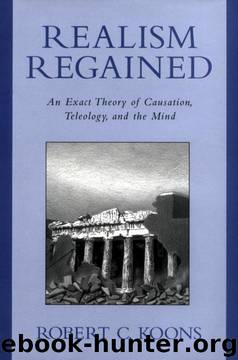Realism Regained: An Exact Theory of Causation, Teleology, and the Mind by Robert C. Koons

Author:Robert C. Koons [Robert C. Koons]
Language: eng
Format: epub
Published: 2012-01-08T01:52:00+00:00
15.3 Knowing How to Infer Correctly
It is important, for my purposes, to distinguish between logical knowing-how (knowing when it is proper to draw a particular inference) and logical knowingthat (knowing the necessity of a given classical validity). Knowing-how is to be defined in terms of a reliable disposition to draw only the correct (strongKleene or Dunn valid) inferences, where this disposition has logical reliability as its proper function (in the sense given in chapter 12). Knowing-that involves knowledge of particular modal facts, which entails the existence of an appropriate causal link between the particular fact known and the knowing of it.
A pattern of inference is knowledge-conferring for a given person only if it has, as realized in the dispositions of that person's mind, the teleofunction of preserving robust (or, at least, veridical) information. A necessary condition of such teleofunctionality is that the cognitive disposition be of such a kind as is typically caused by a corresponding constraint in the world.
We can see the need for such a causal connection by considering Gettier-like examples of failed inferential knowledge. Suppose that Max has proved a mathematical theorem by means of the inference rule of modus ponens. However, Max used modus ponens only because the rule was recommended to him by his astrologer, Morris, and Morris recommended that Max use modus ponens only because Max is a Pisces. Had Max been born under any other sign of the zodiac, Morris would have recommended, and Max would have used, other, unsound rules of inference. Under such circumstances, Max's use of modus ponens is not knowledge-conferring, and so Max's would-be proof provides him with no knowledge of the truth of the theorem.
For inferential knowing-how to be possible, we must have two constraints, one a modal constraint involving logical or mathematical form, and the other a causal constraint linking different beliefs in the mind of the mathematician on the basis of their content.' Take, for instance, the inference pattern corresponding to the T axiom of modal logic: inferring ¢ from ❑¢. This inference pattern is realized in the mind of the mathematician as a causal constraint between belief-types: This inference pattern is an instance of knowing how to reason correctly only if it has the teleofunction of mirroring a corresponding constraint in the world, namely, ❑(❑q -+ 0). This modal constraint is supported by any situation-token sufficiently rich in its support of modal facts. For the causal constraint in the mathematician's mind to have the appropriate teleofunction, it must be such a kind as to be apt to be caused by the corresponding modal constraint. Fortunately, the account of vertical or higher-order causation developed in part I is adequate to the task of postulating such higher-order causal constraints between modal constraints on the one hand and cognitive causal constraints on the other.
In this case, there are general facts about natural selection, or general facts about the human capacity for trial-and-error learning, that can provide the basis for such a higher-order causal constraint. Inference patterns that are
Download
This site does not store any files on its server. We only index and link to content provided by other sites. Please contact the content providers to delete copyright contents if any and email us, we'll remove relevant links or contents immediately.
| Anthropology | Archaeology |
| Philosophy | Politics & Government |
| Social Sciences | Sociology |
| Women's Studies |
Mystic Christianity by Ramacharaka Yogi(824)
The Convoluted Universe: Book One by Dolores Cannon(818)
An Outline of Occult Science by Rudolf Steiner(755)
The Game of Life and How to Play It by Florence Scovel Shinn(702)
Personal Knowledge by Michael Polanyi(673)
The Ancient Engineers by L. Sprague De Camp(647)
The Second Coming of Christ by Paramahansa Yogananda(638)
Be What You Wish by Neville Goddard(617)
A Magical Course in Tarot by Michele Morgan(613)
Soulcraft: Crossing Into the Mysteries of Nature and Psyche by Bill Plotkin(602)
Biocentrism by Bob Berman(581)
Attitudes of Gratitude by M. J. Ryan(543)
The Quantum Enigma by Wolfgang Smith(526)
The Eternal Law: Ancient Greek Philosophy, Modern Physics, and Ultimate Reality by Spencer John H(523)
The Master Key System by Charles F. Haanel(513)
The Key: A True Encounter by Whitley Strieber(494)
Clairvoyance (Extended Annotated Edition) by C. W. Leadbeater(490)
The Magic Labyrinth(489)
The Case Against Reality: Why Evolution Hid the Truth from Our Eyes by Donald Hoffman(486)
